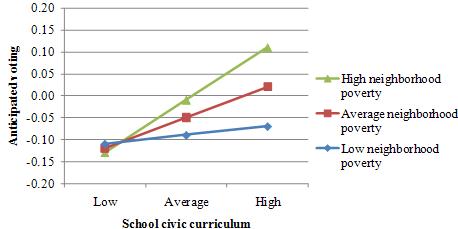FEATURED: New CIRCLE Working Paper on K12 Civic Education
by Britt Wilkenfeld
CIRCLE releases a new working paper (#64) “Does Context Matter? How the Family, Peer, School, and Neighborhood Contexts Relate to Adolescents’ Civic Engagement”
Report Summary: A new CIRCLE Working Paper (#64) by Britt Wilkenfeld examines the effects of several systems of influence (schools, families, neighborhoods, etc) on civic outcomes. The author finds that there are processes inherent in each context that can account for the ways in which environments influence adolescents’ development. The most important processes seem to involve aspects of interpersonal relationships with parents (especially the level of discourse), patterns of activity within schools, institutional resources within neighborhoods, and the collective socialization that occurs in neighborhoods. Schools, among other settings, matter. The author finds that receiving a civics curriculum “appears to be more beneficial to youth attending schools in high poverty neighborhoods than to those attending schools in low-poverty neighborhoods.” For instance, this graph shows that receiving better civics instruction makes by far the most difference to students’ plans to vote if they live in poor neighborhoods:
Thus the paper indicates that the civic engagement gap can be narrowed when the learning opportunity gap is reduced. Schools, although implicated in the existence of a civic engagement gap, also have the potential to narrow the gaps between different groups of students.








June 1st, 2009 at 8:08 am
[…] FEATURED: New CIRCLE Working Paper on K12 Civic Education […]
June 27th, 2009 at 10:51 am
Having looked at the working paper I think the results in figure 1 are also interesting. The figure illustrates the effect the level of poverty has on the school confidence in participation.
July 7th, 2009 at 2:39 am
Does that really matter? I have a bunch of high income friends who very rarely vote..
July 9th, 2009 at 1:46 pm
Hi,
Your organization has been mentioned in the article I recently published.
You can read the article at the link below.
http://www.educationreporting.com/article-how-to-uncork-creative-instruction.php
Wishing you the best life has to offer,
Steu Mann, M.Ed.
July 18th, 2009 at 8:26 pm
Nice informations with great graph in your post.
Thanks.
July 30th, 2009 at 5:53 am
Very great report, very clear, deep analyze and easy to understand.
Thank for your share.
August 10th, 2009 at 5:11 am
Fantastic info !!!
August 10th, 2009 at 5:59 am
Great post !! thx a lot
September 5th, 2009 at 3:52 am
That’s a very good insight into civics instruction.
September 14th, 2009 at 7:15 am
Very interesting, I’m surprised that the level of poverty has such a pronounced effect on voting.
November 3rd, 2009 at 5:44 pm
Thank you, it was very interesting to read:)
November 11th, 2009 at 4:30 am
Given Report summary quite effective and useful.
November 21st, 2009 at 6:59 am
I think that’s a pretty interesting study.
So, people are more inclined to vote if they’ve been through a respectable civics class, huh?
I’ll have to take mental note of that. You never know when these facts will be useful.
December 14th, 2009 at 11:00 am
It’s interesting to data added to graphs like that. It makes become more real somehow. Thanks for this.
February 14th, 2010 at 8:22 pm
No stable income meaning lack of financial support for each individual, most especially the young ones. So the tendency of which, they are deprived of decent living. #1 result of this problem is no sufficient education.
February 25th, 2010 at 6:17 am
Does that really matter? I have a bunch of high income friends who very rarely vote..
May 11th, 2010 at 5:31 am
Parents need to provide their children the decent life that they need to get. Otherwise, they will end up lacking something in their lives.